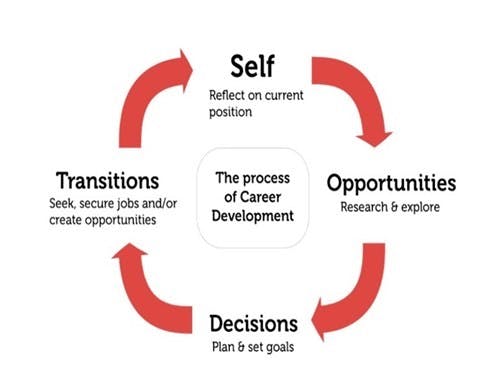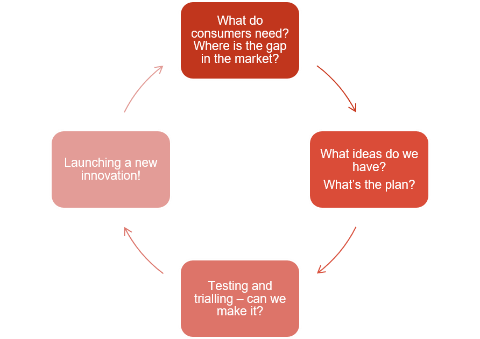A conversation with a senior scientist at Mars led to the creation of a workshop that puts chocolate at the heart of careers development. Marc Steward, careers consultant at the University of Leeds, explains...
The idea behind Plan It with Mars (get it?) came about in 2018 at a Reverse Fair organised by Student Careers at the University of Leeds. The fair took place in the summer and saw employability and careers staff at the university set up faculty-specific stands on campus for local employers to ask about possible partnership work and existing activities that we run with our students.
One such conversation took place between Alice McGenity, Global Care and Treats Process senior scientist at Mars, and myself. Alice was looking after the graduate and placement recruitment for that year and was keen to find out how the careers service could help her with this remit.
It was during the conversation that I got to thinking about a creative way that I could work with Mars. Alice was talking about the process by which a recent chocolate bar she was the lead on was created and then marketed. The process felt very similar to the DOTS career development model (or the new Discover-Develop-Decide-Act model that the University of Leeds Student Careers Service has recently produced).
Alice and I spoke more about this, got excited about the prospect of a joint workshop comparing the two and I went away and started writing some slides based on our conversation.
The workshop
The crux of the workshop was the DOTS model and getting students to think about how they should actively consider their career development during university life. The workshop was eventually delivered twice to first-year International Business students in October 2019 as part of their induction to Student Careers and the University of Leeds.
The workshop starts by comparing the DOTS model with a model Alice created herself to show a similar process in creating and marketing a chocolate bar.
DOTS Careers Model, Watts & Law 1996

Mars Model, Alice McGenity 2018

The workshop then proceeded to concentrate on the DOTS model, looking at each stage of the model and how it applied to the students in their current situation. My philosophy with first-year students is to treat them like adults: be honest, tell them how hard finding placements and graduate jobs can be. However, I also furnish them with information about the great opportunities and support available to them at university and how any of these - from formal student rep roles or first year summer placements to being the social secretary of the Gin Appreciation Society – can develop transferable skills and experiences that will make them attractive to future employers.
With each part of the DOTS model, there was an interactive exercise: a personal SW analysis (from the SWOT model) for self awareness, a Family Fortunes (OK, I am that old) type quiz about on-campus services (opportunity awareness) to address any weaknesses moving forward and a timeline (transition) by which to sit down and think about how they would engage with something other than their studies this year to develop experiences that employers desire from HE students.
While this was a chance for Mars to promote its graduate schemes and the company, their emphasis was also on career development
Threaded throughout each section of the DOTS model, Alice and her colleague, Charles Jurban, a Future Technology scientist (and University of Leeds placement student), chipped in with advice and anecdotes about the work they do at Mars, how the process of creating and marketing a product is similar to the DOTS model but, more importantly, just how important each stage of the DOTS model was to them as an employer.
For me, this was key to the workshop. While this was a chance for Mars to promote its graduate schemes and the company, their emphasis was also on career development and showed how key this is for them in terms of students being well prepared with research and experience when applying to Mars for a job. In fact, towards the end of the workshop, both Alice and Charles talked about extra-curricular activities they had embarked on that made them stand out at their interview with Mars.
Positive feedback
The feedback from the two sessions has been positive. Most of it started with the students wondering what they had turned up to - they were greeted with a very large (and free) chocolate bar and an introductory slide featuring a graphic of the same chocolate bar and Chris Hemsworth as Thor. However, to their immense credit, the students remained open-minded and engaged fully with the workshop. At a recent career fair on campus, I had some of the students come and see me to thank me, not only for the workshop, but for informing them of the opportunities that were available to them as first-year students. Hence their attendance at the career fair in week two of the first year of their degree courses.
I have written for Luminate before about creative ways to deliver career and employability workshops and teaching. From the moment I spoke to Alice, this workshop felt like a good fit, something I would enjoy writing and delivering, and something that would inform and engage the students. Alice's backing of it - and desire to run it again next year - speaks volumes, as does the positive feedback and subsequent proactive and positive actions of the students we presented to.
The views and opinions expressed in this article are those of the author(s) and do not necessarily reflect the position of HECSU/Prospects.
Was this page useful?
Thank you for your feedback
